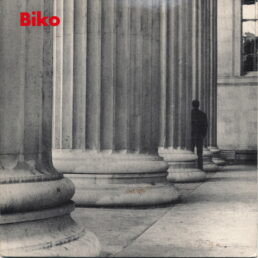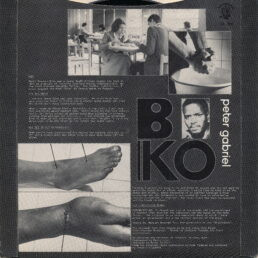“Biko” by Peter Gabriel stands as a potent and enduring song of protest, initially released as a single in August 1980. Featured on his critically acclaimed third solo album, this single version of “Biko” was uniquely re-recorded and remixed by Peter Gabriel himself at Crescent Studios in Bath, with David Lord as the engineer. The original album tapes benefited from the expertise of engineer Hugh Padgham and producer Steve Lillywhite.
The track showcases a stellar lineup of musicians, including Jerry Marotta on drums, Phil Collins lending his talents on surdo, David Rhodes on guitar, and Larry Fast contributing bagpipes and synthesizer. David Ferguson’s screeches add a distinctive element, while Peter Gabriel himself takes on piano and drum pattern duties.
 biko original front
biko original front
The single’s cover art is not just aesthetic; it’s informative, providing crucial context about Stephen Biko and Peter Gabriel’s motivations for releasing the song as a standalone single. The back cover text delves into the heart of the song’s message:
Stephen Biko: Who Was He?
Bantu Stephen Biko, as the cover explains, was a significant young South African leader whose life was tragically cut short in 1977. He died from injuries sustained during interrogation by the South African Security Police, a stark reminder of the brutal realities of apartheid-era South Africa. For those seeking deeper understanding, the cover recommends Donald Woods’ book ‘Biko,’ published by Penguin. This book served as a crucial source of information and inspiration for Peter Gabriel.
The Song’s Purpose: Why “Biko”?
Peter Gabriel articulates his profound respect for Stephen Biko, recognizing him as a figure of immense potential. He believed Biko could have been a transformative leader in Africa and an inspirational figure for young people globally. Gabriel recounts his shock and dismay upon hearing of Biko’s death after his detention, especially given the backdrop of numerous prison suicides in South Africa. This event spurred him to pen down his initial thoughts, which would later evolve into the lyrics of “Biko” two years later. The song is not just a tribute but a lament and a call for awareness.
 biko original back
biko original back
Single Release Rationale
Addressing the decision to release “Biko” as a single after two previous singles from the album, Peter Gabriel outlines several key reasons. Firstly, he aimed to make the song accessible to those who might not purchase the full album. Secondly, he desired radio airplay for “Biko”, amplifying its message to a wider audience. Thirdly, inspired by recording the song in another language (likely referring to German versions of his albums), Gabriel sought to present an alternative mix in English, featuring a re-recorded vocal track and a remixed instrumental.
“Shosholoza”: A Song Within a Song
The single also includes “Shosholoza,” a track that played a pivotal role in shaping the musical direction of “Biko”. “SHOSHOLOZA” (meaning “Go In Peace”) originated from the soundtrack LP DINGAKA. Peter Gabriel was inspired by this unaccompanied chant and created an arrangement, adding a new rhythmic section to integrate it into “Biko”. This incorporation of “Shosholoza” adds a layer of South African musical heritage to the song, enriching its tribute to Stephen Biko and the struggle against apartheid.
No Original Video, But a Later Re-release
Interestingly, no music video accompanied the initial 1980 single release of “Biko”. However, a video was later produced when the song was re-released in 1987. This re-release was timed to coincide with the film ‘Cry Freedom,’ which, like the song, drew inspiration from Donald Woods’ book ‘Biko’. This re-release further cemented the song’s status as an anthem against apartheid and injustice.
Chart Performance and Enduring Legacy
“Biko” entered the UK charts on August 23, 1980, achieving a peak position of 38 and remaining in the Top 75 for three weeks. While not a chart-topping hit, its impact transcended chart numbers. The versions of “Biko” and “Shosholoza” featured on this single are also available on the digital album ‘Flotsam and Jetsam’. Furthermore, German versions of Peter Gabriel’s third and fourth albums, titled ‘ein deutsches album’ and ‘deutsches album’ respectively, offer further exploration of his work from this period.
The original single was released on both 7″ and 12″ vinyl formats, with various track listings including “Jetzt Kommt Die Flut” on some 12″ versions. Peter Gabriel’s commitment to raising awareness about Stephen Biko extended beyond the song itself. On November 25, 1987, he appeared on the BBC TV program ‘Wogan’ alongside Donald and Wendy Woods, highlighting the book that inspired both the song “Biko” and the movie ‘Cry Freedom’.
“Biko By Peter Gabriel” remains a powerful and poignant song, not only as a musical masterpiece but as a vital historical and social commentary, ensuring the legacy of Stephen Biko and the fight against injustice continues to resonate.
